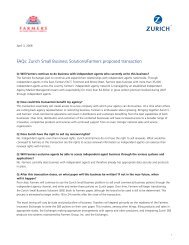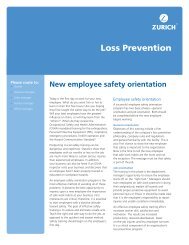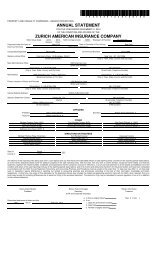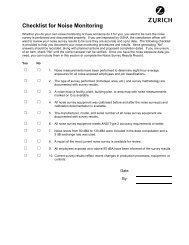Know the risks - Zurich
Know the risks - Zurich
Know the risks - Zurich
You also want an ePaper? Increase the reach of your titles
YUMPU automatically turns print PDFs into web optimized ePapers that Google loves.
Most indemnification statutes distinguish between derivative actions and third-partyactions. Derivative actions are actions in <strong>the</strong> name and on behalf of <strong>the</strong> corporation,and <strong>the</strong> recovery, if any, goes to <strong>the</strong> corporation. Because of <strong>the</strong> circular nature ofany settlement or judgment, a director’s right to be indemnified in connection witha derivative action is more limited than <strong>the</strong> right to be indemnified with respect tothird-party actions. For example, under Delaware law and in many o<strong>the</strong>r states, adirector may be indemnified against expenses (including attorney’s fees) incurred in<strong>the</strong> defense of a derivative action unless he was adjudged liable for negligence ormisconduct, but may not be indemnified against any judgment or settlement in anysuch derivative action. With respect to third-party actions, on <strong>the</strong> o<strong>the</strong>r hand, <strong>the</strong>corporation may indemnify directors against expenses, judgments, fines and amountspaid in settlement, provided that in ei<strong>the</strong>r case <strong>the</strong> director acted “in good faith and ina manner he reasonably believed to be in or not opposed to <strong>the</strong> best interests of <strong>the</strong>corporation” (and, with respect to criminal actions, if he had no reasonable cause tobelieve his conduct was unlawful).Indemnification under Delaware law must be authorized in each case upon adetermination that indemnification is proper because <strong>the</strong> director has met <strong>the</strong>standard of conduct described above. This determination must be made ei<strong>the</strong>r by<strong>the</strong> board of directors (by a majority vote of a quorum of directors who were notparties to <strong>the</strong> suit), by independent legal counsel or by <strong>the</strong> shareholders. The statutesgenerally also allow advances of expenses during <strong>the</strong> pendency of <strong>the</strong> lawsuit,although specific language in <strong>the</strong> charter or bylaws may be needed to clarify <strong>the</strong>right to advancement.The indemnification protections set forth in most states’ indemnification statutesare permissive in nature. Therefore, except in certain limited circumstances, aninstitution is not required to indemnify a director or officer unless <strong>the</strong> corporation’sarticles of incorporation, by-laws, or o<strong>the</strong>r corporate documents specificallymandate such indemnification. An institution intending to provide <strong>the</strong> broadestscope of indemnification for its directors and officers should include <strong>the</strong> followingfeatures in its internal indemnification provision:• Providing for indemnification “to <strong>the</strong> fullest extent permitted by law.”• Requiring indemnification, ra<strong>the</strong>r than merely permitting <strong>the</strong> corporationto indemnify.• Requiring <strong>the</strong> advancement of defense expenses, subject only to an unsecuredobligation to repay <strong>the</strong> expenses if a court subsequently determines <strong>the</strong>indemnification was not permitted.• Shifting <strong>the</strong> burden of proof to <strong>the</strong> corporation to prove that <strong>the</strong> director orofficer is not entitled to <strong>the</strong> requested indemnification.• Requiring <strong>the</strong> corporation to reimburse <strong>the</strong> director or officer for any expensesincurred in an indemnification claim against <strong>the</strong> corporation if <strong>the</strong> director orofficer is successful in whole or in part.• Providing that <strong>the</strong> director or officer has a right to an appeal or an independent denovo determination as to indemnification entitlement.24Financial institutions guide
















